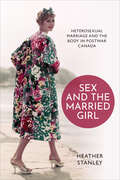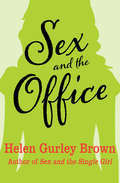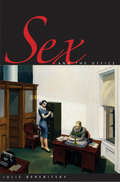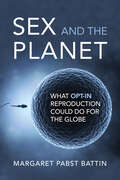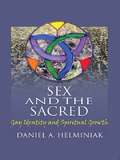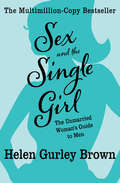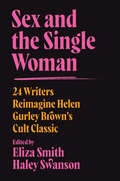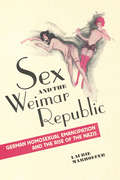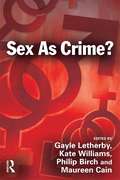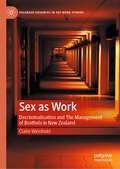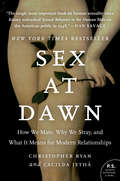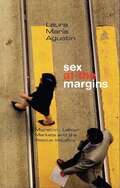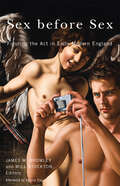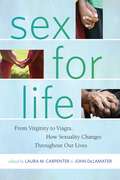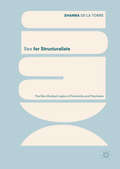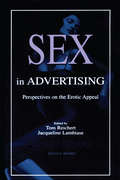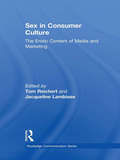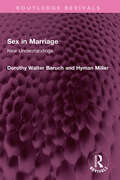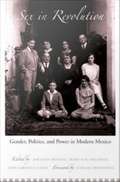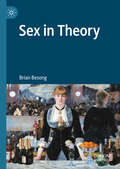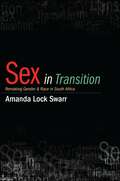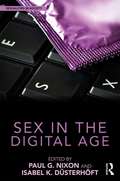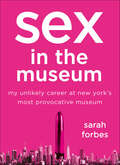- Table View
- List View
Sex and the Married Girl: Heterosexual Marriage and the Body in Postwar Canada (Studies in Gender and History)
by Heather StanleySex – who was having it, who shouldn’t have it, and who was supposed to be having it but wasn’t – was a major concern to social authorities in the immediate postwar era. Though they are often remembered with nostalgia as a sexually simpler time, the 1950s and early 1960s were incredibly sexually productive years. Sex and the Married Girl examines how two interrelated and dominant groups in Canada – medical professionals and church leaders – used married heterosexual female sexuality as a lever to rebuild the Canadian family and the state itself. Using embodied historical methodologies, the book examines not only discourses around sex but also how those discourses could influence the actual experience of sex for married women. Heather Stanley draws upon extensive oral life histories of women who lived, married, and had sex during this liminal social period to demonstrate that this was a time of simultaneous sexual and gender quiescence and change.
Sex and the Office
by Helen Gurley BrownHelen Gurley Brown adds dazzle to dull office days in her follow-up to the phenomenal bestseller Sex and the Single Girl The classic book from 1965 tells what it was really like to be the girl in a Mad Men–style workplace. Sex and the Office became the definitive, comprehensive guide to working life for an entire generation of women. Alongside advice about how to deal with your boss, manage office politics, and make the most of personal and professional opportunities in the office, Helen Gurley Brown also shares stories from her own office days. A classic of its time, this stands as a frank look at how to get ahead, not just through working hard but through playing hard, too.
Sex and the Office
by Julie BerebitskyIn this engaging book—the first to historicize our understanding of sexual harassment in the workplace—Julie Berebitsky explores how Americans’ attitudes toward sexuality and gender in the office have changed since the 1860s, when women first took jobs as clerks in the U. S. Treasury office. Berebitsky recounts the actual experiences of female and male office workers; draws on archival sources ranging from the records of investigators looking for waste in government offices during World War II to the personal papers ofCosmopolitaneditor Helen Gurley Brown andMs. magazine founder Gloria Steinem; and explores how popular sources—including cartoons, advertisements, advice guides, and a wide array of fictional accounts—have represented wanted and unwelcome romantic and sexual advances. This range of evidence and the study’s long scope expose both notable transformations and startling continuities in the interplay of gender, power and desire at work.
Sex and the Planet: What Opt-In Reproduction Could Do for the Globe (Basic Bioethics)
by Margaret Pabst BattinWhat if human reproduction was always elective? A prominent bioethicist speculates about the possibilities—and the likely consequences.What would the world be like if all pregnancy was intended, not unintended as it is nearly half the time now? Considerably better, Margaret Pabst Battin suggests in Sex and the Planet, a provocative thought experiment with far-reaching real-world implications. Many of the world&’s most vexing and seemingly intractable issues begin with sex—when sperm meets egg, as Battin puts it—abortion, adolescent pregnancy, high-risk pregnancy, sexual violence, population growth and decline. Rethinking reproductive rights and exposing our many mistaken assumptions about sex, Sex and the Planet offers an optimistic picture of how we might solve these problems—by drastically curtailing unintended pregnancies using currently available methods.How we see this picture—as recommendation, prediction, utopian fantasy, totalitarian plot, hypothetical conjecture, or realistic solution—depends to a great degree on which of thirteen problematic assumptions we maintain, assumptions Battin works to identify and challenge. Taking on sensitive topics like abortion and rape and religious issues around contraception, she shows how a fully informed, nonideological approach could defuse much of the friction such issues tend to generate. Also, in her attention to male contraception and the asymmetry of female and male reproductive control, she pulls in the 50 percent of the human race—those with Y chromosomes—largely left out of discussions of reproductive health. Sex and the Planet, finally, takes a global view, inviting us to consider a possible—even plausible—reproductive future.
Sex and the Sacred: Gay Identity and Spiritual Growth
by Daniel A HelminiakA down-to-earth look at the spiritual power of sexSex and the Sacred examines the spiritual dimension of human sexuality in a way that is free of religious affiliation but still open to traditional religion and belief in God. Dr. Daniel Helminiak, author of the best-selling What the Bible Really Says about Homosexuality, looks at the relationship between sexuality and spirituality, first, from a humanistic perspective and, then, a more familiar Christian point of view. In particular, he encourages LGBTI people to reclaim their spiritual heritage without apology. This unique book emphasizes spiritual commitment as an essential facet of LGBTI/queer consciousness and addresses such burning themes as coming out, the importance of self-acceptance, gay marriage, gay bashing, and the ethics of gay sex. Sex and the Sacred combines a psychological approach to spirituality with common sense and compassion, inspiring a break from moralistic religion and an understanding of what true spirituality means. The book applies this understanding to Christian topics such as the Bible, Fundamentalism, and the future of Christianity, and shows how coming out was an issue for Jesus, how homosexual experience relates to the Christian Trinity, and how Western Civilization became so sex-negative.Sex and the Sacred presents in the end a radical vision of Christianity open to all people. Religious leaders of all denominations, educators, counselors, members of the gay/lesbian/bisexual/transgender community, non-religious spiritual seekers, and anyone interested in the relationship between spirituality and sexuality will find this book enlightening and uplifting. Sex and the Sacred examines: the spiritual drive that is built into human sexuality the standard religious arguments against gay marriage a sustained argument that Biblical Fundamentalism is not Christian spiritual lessons from the AIDS epidemic the right and wrong of sex-queer and otherwise homosexuality in Catholic teaching and practice sexual ethics without religion a vision for a renewed Christianity within a global community
Sex and the Single Girl: The Unmarried Woman's Guide to Men (Cult Classics Ser. #Vol. 1)
by Helen Gurley BrownThe 1962 blockbuster that took on &“one of the most absurd (if universal) myths of our time: that every girl must be married&” (The New York Times). Helen Gurley Brown, the iconic editor in chief of Cosmopolitan for thirty-two years, is considered one of the most influential figures of Second Wave feminism. Her first book sold millions of copies, became a cultural phenomenon, and ushered in a whole new way of thinking about work, men, and life. Feisty, fun, and totally frank, Sex and the Single Girl offers advice to unmarried women that is as relevant today as it was when it burst onto the scene in the 1960s. This spirited manifesto puts women—and what they want—first. It captures the exuberance, optimism, and independence that have influenced the lives of so many contemporary American women.
Sex and the Single Woman: 24 Writers Reimagine Helen Gurley Brown's Cult Classic
by Haley Swanson Eliza SmithOne of Bustle's Best Books of MayA feminist anthology inspired by legendary Cosmopolitan editor Helen Gurley Brown’s Sex and the Single Girl, featuring twenty-four new essays on the triumphs and heartbreaks of modern singlehood from acclaimed and bestselling authors, including Kristen Arnett, Morgan Parker, Evette Dionne, and Melissa Febos.Sixty years ago, Helen Gurley Brown's Sex and the Single Girl sent shockwaves through the United States, selling more than two million copies in three weeks. Helen’s message was radical for its time: marriage wasn’t essential for women to lead rich, fulfilling lives.Now, in these critical, wry, and expansive essays, twenty-four writers reconsider Helen’s advice and how it applies to their own paths, fielding topics that she couldn’t—or wouldn’t—conceive of in 1962: contraception and abortion (an omission demanded by her publisher), queer and trans womanhood, polyamory, celibacy, interracial dating, bodies of all kinds, consent, sex work, IVF, and the pop culture that both saves and fails us.Eliza Smith and Haley Swanson’s revisionist anthology honors Brown’s irreverent spirit while also validating our modern experiences of singlehood, encouraging us all to reclaim joy where it’s so often been denied.
Sex and the Weimar Republic
by Laurie MarhoeferLiberated, licentious, or merely liberal, the sexual freedoms of Germany's Weimar Republic have become legendary. The home of the world's first gay rights movement, the republic embodied a progressive, secular vision of sexual liberation. Immortalized - however misleadingly - in Christopher Isherwood's Berlin Stories and the musical Cabaret, Weimar's freedoms have become a touchstone for the politics of sexual emancipation.Yet, as Laurie Marhoefer shows in Sex and Weimar Republic, those sexual freedoms were only obtained at the expense of a minority who were deemed sexually disordered. In Weimar Germany, the citizen's right to sexual freedom came with a duty to keep sexuality private, non-commercial, and respectable.Sex and the Weimar Republic examines the rise of sexual tolerance through the debates which surrounded "immoral" sexuality: obscenity, male homosexuality, lesbianism, transgender identity, heterosexual promiscuity, and prostitution. It follows the sexual politics of a swath of Weimar society ranging from sexologist Magnus Hirschfeld to Nazi stormtrooper Ernst Röhm. Tracing the connections between toleration and regulation, Marhoefer's observations remain relevant to the politics of sexuality today.
Sex as Crime?
by Kate Williams Gayle Letherby Maureen Cain Philip BirchThis book brings together chapters by academics, researchers and practitioners to analyse how crimes such as sex work, domestic violence and rape and sexual assault have risen up the Government agenda in recent years. For example, the 'Paying the Price' consultation exercise on sex work in 2004, and recent legislation around sex crimes, including the Sex Offences Act (2003). This is a multi-disciplinary, social scientific, pro-feminist collection, which draws upon practice, empirical research, documentary analysis and overviews of research in the areas of sex work and sexual violence. Within Sex as Crime there are two distinct sub-sections: 'Sex for Sale' and 'Sex as Violence', but the broader and overriding link of sex as crime remains a paramount theme that spans the collection. Chapters include discussions of the impact of new regulations on street sex workers, and of street sex work on community residents, the use of the internet by men who pay for sex and men who sell it, sexual violence and identity, sex crimes against children and protecting children online and working with sex offenders. Other chapters explore reasons for such offending behaviour.
Sex as Work: Decriminalisation and The Management of Brothels in New Zealand (Palgrave Advances in Sex Work Studies)
by Claire WeinholdThis book examines the ways that brothels are managed under decriminalisation in New Zealand. New Zealand decriminalised sex work in 2003 with the passage of the Prostitution Reform Act, making it the first country to do so. Decriminalisation situates brothels as ‘businesses like any other’ and creates a legislative platform for better working conditions for sex workers. Nevertheless, we have limited understanding of how brothels are managed in New Zealand. Drawing on interviews with brothel operators and sex workers, this book explores how the law is understood and implemented, how brothel operators position their businesses, and how they seek legitimacy in a historically stigmatised sector. It also examines the rules and norms by which operators manage their businesses and the possibilities for sex workers to consent to commercial sexual services in the context of neoliberal norms of work and of managers who expect them to be professionalised, responsibilised and productive.
Sex at Dawn: How We Mate, Why We Stray, and What It Means for Modern Relationships (P. S. Series)
by Christopher Ryan Cacilda JethaSince Darwin's day, we've been told that sexual monogamy comes naturally to our species. Mainstream science-as well as religious and cultural institutions-has maintained that men and women evolved in families in which a man's possessions and protection were exchanged for a woman's fertility and fidelity. But this narrative is collapsing. Fewer and fewer couples are getting married, and divorce rates keep climbing as adultery and flagging libido drag down even seemingly solid marriages. How can reality be reconciled with the accepted narrative? It can't be, according to renegade thinkers Christopher Ryan and Cacilda JethÅ. While debunking almost everything we "know" about sex, they offer a bold alternative explanation in this provocative and brilliant book. Ryan and JethÅ's central contention is that human beings evolved in egalitarian groups that shared food, child care, and, often, sexual partners. Weaving together convergent, frequently overlooked evidence from anthropology, archaeology, primatology, anatomy, and psychosexuality, the authors show how far from human nature monogamy really is. Human beings everywhere and in every era have confronted the same familiar, intimate situations in surprisingly different ways. The authors expose the ancient roots of human sexuality while pointing toward a more optimistic future illuminated by our innate capacities for love, cooperation, and generosity. With intelligence, humor, and wonder, Ryan and JethÅ show how our promiscuous past haunts our struggles over monogamy, sexual orientation, and family dynamics. They explore why long-term fidelity can be so difficult for so many; why sexual passion tends to fade even as love deepens; why many middle-aged men risk everything for transient affairs with younger women; why homosexuality persists in the face of standard evolutionary logic; and what the human body reveals about the prehistoric origins of modern sexuality. In the tradition of the best historical and scientific writing, Sex at Dawn unapologetically upends unwarranted assumptions and unfounded conclusions while offering a revolutionary understanding of why we live and love as we do.
Sex at the Margins
by Laura María AgustinThis groundbreaking book explodes several myths: that selling sex is completely different from any other kind of work; that migrants who sell sex are passive victims; and that the multitude of people out to save them are without self-interest. <p><p> Laura Agustín makes a passionate case against these stereotypes, arguing that the label 'trafficked' does not accurately describe migrants' lives and that the 'rescue industry' disempowers them. Based on extensive research amongst migrants who sell sex and social helpers, Sex at the Margins provides a radically different analysis. Frequently, says Agustín, migrants make rational choices to travel and work in the sex industry. Although they are treated like a marginalised group they form part of the dynamic global economy. <p> Both powerful and controversial, this book is essential reading for all those who want to understand the increasingly important relationship between sex markets, migration and the desire for social justice.
Sex before Sex: Figuring the Act in Early Modern England
by James M. Bromley Will StocktonWhat is sex exactly? Does everyone agree on a definition? And does that definition hold when considering literary production in other times and places? Sex before Sex makes clear that we cannot simply transfer our contemporary notions of what constitutes a sex act into the past and expect them to be true for the people who were then reading literature and watching plays. The contributors confront how our current critical assumptions about definitions of sex restrict our understanding of representations of sexuality in early modern England. Drawing attention to overlooked forms of sexual activity in early modern culture, from anilingus and interspecies sex to &“chin-chucking&” and convivial drinking, Sex before Sex offers a multifaceted view of what sex looked like before the term entered history. Through incisive interpretations of a wide range of literary texts, including Romeo and Juliet, The Comedy of Errors, Paradise Lost, the figure of Lucretia, and pornographic poetry, this collection queries what might constitute sex in the absence of a widely accepted definition and how a historicized concept of sex affects the kinds of arguments that can be made about early modern sexualities.Contributors: Holly Dugan, George Washington U; Will Fisher, CUNY–Lehman College; Stephen Guy-Bray, U of British Columbia; Melissa J. Jones, Eastern Michigan U; Thomas H. Luxon, Dartmouth College; Nicholas F. Radel, Furman U; Kathryn Schwarz, Vanderbilt U; Christine Varnado, U of Buffalo–SUNY.
Sex for Life: From Virginity to Viagra, How Sexuality Changes Throughout Our Lives (Intersections #10)
by John DeLamater Laura M. CarpenterSexual beliefs, behaviors and identities are interwoven throughout our lives, from childhood to old age. An edited collection of original empirical contributions united through its use of a distinctive, cutting-edge theoretical framework, Sex for Life critically examines sexuality across the entire lifespan. Rooted in diverse disciplines and employing a wide range of research methods, the chapters explore the sexual and social transitions that typically map to broad life stages, as well as key age-graded physiological transitions, such as puberty and menopause, while drawing on the latest developments in gender, sexuality, and life course studies.Sex for Life explores a wide variety of topics, including puberty, sexual initiation, coming out, sexual assault, marriage/life partnering, disability onset, immigration, divorce, menopause, and widowhood, always attending to the social locations – including gender, race, ethnicity, and social class – that shape, and are shaped by, sexuality. The empirical work collected in Sex for Life ultimately speaks to important public policy issues, such as sex education, aging societies, and the increasing politicization of scientific research. Accessibly written, the contributions capture the interplay between individual lives and the ever-changing social-historical context, facilitating new insight not only into people’s sexual lives, but also into ways of studying them, ultimately providing a fresh, new perspective on sexuality.
Sex for Structuralists: The Non-Oedipal Logics of Femininity and Psychosis
by Shanna de la TorreThis book argues that structuralism makes itself useful when it engages with the non-Oedipal logics of femininity and psychosis. Building from the psychoanalytic belief that norms repress unconscious desire while structures open onto the creative resources of the symbolic, Sex for Structuralists looks to key texts in myth, trauma, and unconscious fantasy by Sigmund Freud, Jacques Lacan, and Claude Lévi-Strauss. It also examines innovative writings by contemporary Lacanian thinkers in order to discover what becomes of structuralism when the ground upon which it ostensibly stands (namely, that of the zero symbol or the incest prohibition) drops out from under it.
Sex in Advertising: Perspectives on the Erotic Appeal (Routledge Communication Series)
by Tom Reichert Jacqueline LambiaseSex in Advertising: Perspectives on the Erotic Appeal is the first book to thoroughly tackle important issues about sex in advertising. What is it? Does it work? How does it affect individuals and society? Well-respected scholars and popular writers answer these questions as they address the following issues associated with sex in today's advertising environment: gender differences and representation, unintended social effects, subliminal embeds, appeals to the homosexual community, and new media. The book contains a blend of perspectives, including original experimental studies, interpretive and historical analyses, and cultural critiques. The definitive source on sex in advertising, this book: *is centralized around a singular theme: Understanding how sex in advertising appeals work and why they are so prevalent; *includes multiple perspectives to capture the richness of sexual appeals; *brings together viewpoints from both well-known scholars and writers; *provides a wealth of ideas and research questions for those interested in the topic; and *contains discussions of sex in advertising from its roots in the 1700s to online advertising today and beyond. The book is must reading for advertising and gender researchers, scholars, and students. Anyone interested in mass media, consumer psychology, and popular culture will find this book an essential resource.
Sex in Consumer Culture: The Erotic Content of Media and Marketing (Routledge Communication Series)
by Tom Reichert Jacqueline LambiaseSex in Consumer Culture: The Erotic Content of Media and Marketing considers the use of sex to promote brands, magazines, video games, TV programming, music, and movies. Offering both quantitative and qualitative perspectives from leading scholars in a variety of disciplines, this volume addresses a range of integral issues such as media promotion, racial representations, appeals to gay and lesbian communities, content analyses, and case studies. Chapters represent diverse perspectives, addressing such questions as:*What happens when sexual content created for adults reaches children?*What meaning do sexual words and images have within the contexts of sporting events, trade shows, video games, personal ads, or consumer Web sites?*What effects might sex-tinged images have on audiences, and where should the focus be for new effects research?*Where are the current boundaries between pornography and mainstream sexual depictions?Exploring sexual information as it is used in mass media to sell products and programs, Sex in Consumer Culture is an important collection, and it will be of great interest for scholars and students in advertising, marketing, media promotion, persuasion, mass communication & society, and gender studies.
Sex in Marriage: New Understandings (Routledge Revivals)
by Dorothy Walter Baruch Hyman MillerFirst Published in 1963, Sex in Marriage presents down to earth, practical guidance on the emotional and physical aspects of life, love and marriage. The authors both experienced psychotherapists, have felt that a new approach was needed. The book explains in a straightforward and thorough manner the sources of satisfaction and the roots of discontent that lie beneath the surface of any marriage. It traces marriage from the beginning, through its middle years and into its older stages, including considerations that are concrete and practical but still have a fundamental and sound emotional base. The book illustrates how attitudes in sex and marriage go back to childhood and how early experiences, though forgotten, can still exercise important influences. In helping to alleviate old guilts and anxieties, the book makes an essential contribution. This is an interesting read for sociologists, psychologists and for general readers.
Sex in Peace Operations
by Gabrielle SimmGabrielle Simm's critical re-evaluation of sex between international personnel and local people examines the zero-tolerance policy on sexual exploitation and abuse and its international legal framework. Whereas most preceding studies of the issue have focused exclusively on military peacekeepers, Sex in Peace Operations also covers the private military contractors and humanitarian NGO workers who play increasingly important roles in peace operations. Informed by socio-legal studies, Simm uses three case studies (Bosnia, West Africa and the Democratic Republic of the Congo) to illustrate the extent of the problem and demonstrate that the problems of impunity for sexual crimes are not just a failure of political will but the result of the structural weaknesses of international law in addressing non-state actors. Combining the insights of feminist critique with a regulatory approach to international law, her conclusions will interest scholars of international law, peace and conflict studies, gender and sexuality, and development.
Sex in Revolution: Gender, Politics, and Power in Modern Mexicoa
by Jocelyn Olcott Mary Kay Vaughan Gabriela CanoSex in Revolution challenges the prevailing narratives of the Mexican Revolution and postrevolutionary state formation by placing women at center stage. Bringing to bear decades of feminist scholarship and cultural approaches to Mexican history, the essays in this book demonstrate how women seized opportunities created by modernization efforts and revolutionary upheaval to challenge conventions of sexuality, work, family life, religious practices, and civil rights. Concentrating on episodes and phenomena that occurred between 1915 and 1950, the contributors deftly render experiences ranging from those of a transgendered Zapatista soldier to upright damas catlicas and Mexico City's chicas modernas pilloried by the press and male students. Women refashioned their lives by seeking relief from bad marriages through divorce courts and preparing for new employment opportunities through vocational education. Activists ranging from Catholics to Communists mobilized for political and social rights. Although forced to compromise in the face of fierce opposition, these women made an indelible imprint on postrevolutionary society. These essays illuminate emerging practices of femininity and masculinity, stressing the formation of subjectivity through civil-society mobilizations, spectatorship and entertainment, and locales such as workplaces, schools, churches, and homes. The volume's epilogue examines how second-wave feminism catalyzed this revolutionary legacy, sparking widespread, more radically egalitarian rural women's organizing in the wake of late-twentieth-century democratization campaigns. The conclusion considers the Mexican experience alongside those of other postrevolutionary societies, offering a critical comparative perspective. Contributors. Ann S. Blum, Kristina A. Boylan, Gabriela Cano, Mara Teresa Fernndez Aceves, Heather Fowler-Salamini, Susan Gauss, Temma Kaplan, Carlos Monsivis, Jocelyn Olcott, Anne Rubenstein, Patience Schell, Stephanie Smith, Lynn Stephen, Julia Tun, Mary Kay Vaughan
Sex in Theory
by Brian BesongThis volume explores the major moral theories and their distinctive approaches and controversial implications regarding sex. Despite being a commonplace human activity, contemporary discussions of the norms regarding sex—particularly those that connect with the major moral theories—are relatively rare. This volume shows that the relative silence is important, for all the major moral theories appear to have controversial implications about the morality and value of sex. Consequently, either widespread Western assumptions about sex are mistaken or else the major moral theories have serious problems when it comes to the ethics of the bedroom. Adopting a metaethical Mooreanism about our sexual intuitions offers a potential compromise, such that some of the more novel and controversial Western intuitions are abandoned with resulting room for at least one moral theory to remain viable.
Sex in Transition: Remaking Gender and Race in South Africa
by Amanda Lock SwarrHonorable Mention, 2013 Ruth Benedict Book Prize presented by the Association for Queer AnthropologyHonorable Mention, 2014 Distinguished Book Award presented by the Section on Sexualities of the American Sociological AssociationWinner of the 2013 Sylvia Rivera Award in Transgender Studies presented by the Center for Gay and Lesbian StudiesSex in Transition explores the lives of those who undermine the man/woman binary, exposing the gendered contradictions of apartheid and the transition to democracy in South Africa. In this context, gender liminality—a way to describe spaces between common conceptions of "man" and "woman"—is expressed by South Africans who identify as transgender, transsexual, transvestite, intersex, lesbian, gay, and/or eschew these categories altogether. This book is the first academic exploration of challenges to the man/woman binary on the African continent and brings together gender, queer, and postcolonial studies to question the stability of sex. It examines issues including why transsexuals' sex transitions were encouraged under apartheid and illegal during the political transition to democracy and how butch lesbians and drag queens in urban townships reshape race and gender. Sex in Transition challenges the dominance of theoretical frameworks based in the global North, drawing on fifteen years of research in South Africa to define the parameters of a new transnational transgender and sexuality studies.
Sex in the Digital Age (Sexualities in Society)
by Paul G Nixon Isabel K. DüsterhöftShifts in societal development resulting from economic and technological advancements have had an impact upon the development of human sexuality and behaviour, and with the expansion of developments such as the Internet and associated technologies, it is likely that further societal shifts will ensue. This book recognises the importance of new digital spaces for discourses surrounding sexuality, examining issues such as pornography; sex education and health; LGBTQ sexualities; polysexuality or polyamory; abstention; sexual abuse and violence; erotic online literature; sex therapy; teledildonics; sex and gaming; online dating; celebrity porn; young people and sexual media; and sexting and sextainment, all of which are prominently affected by the use of digital media. With case studies drawn from the US, the UK and Europe, Sex in the Digital Age engages in discussion about the changing acceptance of sex in the 21st century and part played in that by digital media, and considers the future of sex and sexuality in an increasingly digital age. It will therefore appear to scholars across the social sciences with interests in gender and sexuality, new technologies and media and cultural studies.
Sex in the Heartland
by Beth BaileySex in the Heartland is the story of the sexual revolution in a small university town in the quintessential heartland state of Kansas. Bypassing the oft-told tales of radicals and revolutionaries on either coast, Beth Bailey argues that the revolution was forged in towns and cities alike, as "ordinary" people struggled over the boundaries of public and private sexual behavior in postwar America. Bailey fundamentally challenges contemporary perceptions of the revolution as simply a triumph of free love and gay lib. Rather, she explores the long-term and mainstream changes in American society, beginning in the economic and social dislocations of World War II and the explosion of mass media and communication, which aided and abetted the sexual upheaval of the 1960s. Focusing on Lawrence, Kansas, we discover the intricacies and depth of a transformation that was nurtured at the grass roots. Americans used the concept of revolution to make sense of social and sexual changes as they lived through them. Everything from the birth control pill and counterculture to Civil Rights, was conflated into "the revolution," an accessible but deceptive simplification, too easy to both glorify and vilify. Bailey untangles the radically different origins, intentions, and outcomes of these events to help us understand their roles and meanings for sex in contemporary America. She argues that the sexual revolution challenged and partially overturned a system of sexual controls based on oppression, inequality, and exploitation, and created new models of sex and gender relations that have shaped our society in powerful and positive ways.
Sex in the Museum: My Unlikely Career at New York's Most Provocative Museum
by Sarah ForbesSarah Forbes was in graduate school when she stumbled upon a museum dedicated to . . . sex. The anthropology student hesitated when her boyfriend suggested she apply for a job, but apply she did, and it wasn’t long before a part-time position at New York’s MUSEUM OF SEX lead to a gig as the museum's curator. That was over twelve years ago. Now Sarah—a married mother of two—proudly sports her title as Curator of Sex. In SEX IN THE MUSEUM, Sarah invites readers to travel from suburban garages where men and women build sex machines, to factories that make sex toys, to labyrinthine archives of erotica collectors. Escorting us in to the hidden world of sex, illuminating the never-talked-about communities and eccentricities of our sexual subcultures, and telling her own personal story of a decade at The Museum of Sex, Sarah asks readers to grapple with the same questions she did: when it comes to sex, what is good, bad, deviant, normal? Do such terms even apply? If everyone has sexual secrets, is it possible to really know another person and be known by them? And importantly, in our hyper-sexualized world, is it still possible to fall in love?
